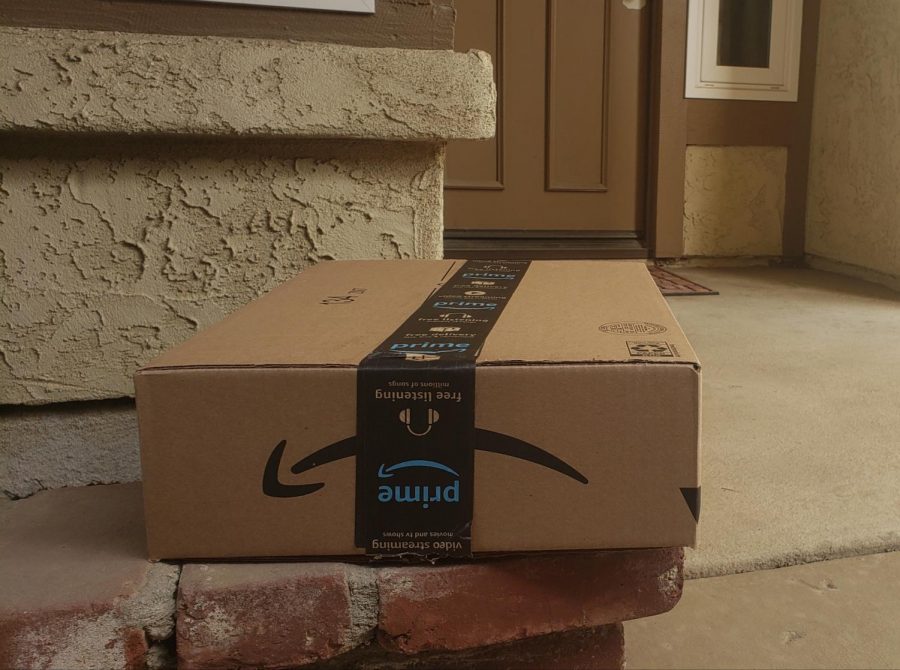Is Amazon Unethical or Just Efficient?
Amazon Package sitting on the porch.
Amazon is one of the most important and most efficient companies in the world, as highlighted by its success through the COVID-19 pandemic. However constant complaints and stories from former employees about the stress and danger of working in an Amazon warehouse prove that the corporation’s efficiency does not come without its victims.
With over 1,000,000 employees and $386 billion dollars in revenue in 2020, it is no secret that Amazon plays a critical role in the lives of nearly all Americans. However, it may not come as a surprise that to become such a successful company, Amazon has sacrificed the priority of the worker for the priority of the consumer. Whether or not Amazon is good for the economy has been debated by economists for years, and there may never be a clear answer to the question. The most clear issue with Amazon does not lie in the economics but rather the danger of the workplace.
It seems that almost year round Amazon is met with new complaints and horror stories from employees about their time working at Amazon. In some of the most recent accounts, over 50 Amazon employees outlined their struggles with safety in a Frontline documentary.
“The part they don’t talk about is the safety rules that you have to ignore to make rate,” said a former fulfillment center employee. Amazon’s vision statement is to be the Earth’s most customer-centric company, which can be seen through their fast shipping dates and prices lower than most other retailers on the market. The issue with this vision is when it starts to impact the health and safety of those working at the company. Countless allegations from former employees outline the unrealistic expectations that are set for employees and the possible consequences that come with meeting them.
“I was a picker and we were expected to always pick 400 units within the hour in seven seconds of each item we picked. I couldn’t handle it. I’m a human being, not a robot,” said Juan Espinoza in an interview with The Guardian, while describing his job at one of Amazon’s New York warehouses.
One of the ways Amazon puts pressure on their workers to make their rates is by scattering security cameras around the warehouse that follow each employee’s every move. Employees are also given timers that countdown the seconds that they must complete their job in order to stay on pace. The threat of being fired if they are unable to complete their work in the allotted amount of time puts these employees under an intense amount of stress, which is simply not worth the small gains in productivity.
This stress is the only explanation for the Amazon injury rate that is close to double the industry standard. A study by Reveal News confirmed there is over a 7% chance that in a worker’s time as an Amazon employee they will undergo a serious injury.
Jeff Willke, who has recently stepped down as consumer boss, dismissed the claims, reasoning that people would not stay at the company if the work rates were unrealistic: “People come to work, because these are great jobs. They’re safe. They pay double the [national] minimum wage,” Willke said.
The jobs do pay a minimum wage of $15 dollars an hour in all states, which is better than you will find at most of Amazon’s competitors. However, this is not the issue that most of these former employees have with the company. Their issue is the stress that makes them feel as though they need to put themselves in harm’s way to simply keep their job.
“Although I’m sure it’s nice having the higher minimum wage,” said Troy Grandi, senior at Cam High, “I don’t think that can be used as an excuse for their injury rate being double the average.”
Amazon has been successful and cutting edge in its monitoring processes of employees, and other companies are likely to follow its footsteps. The increased efficiency rates of a Prime subscription may be nice for consumers and profit margins in the short term, but they will likely do more damage to employees’ health in the long term.

Hi, I'm Lucas, and I'm a senior at Cam High. I've always enjoyed writing, so I decided to take that to The Stinger this year.

















































































![Senior Ditch Day... Relaxation or Truancy? [Video]](https://achsstinger.com/wp-content/uploads/2017/10/IMG_7119-900x599.jpg)
![Heavy Rain Hits Cam High [video]](https://achsstinger.com/wp-content/uploads/2017/02/maxresdefault-900x506.jpg)



